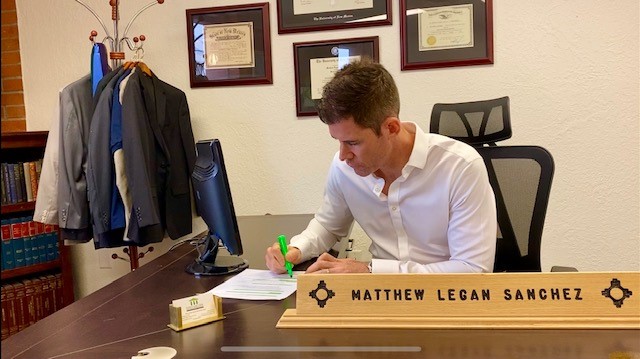
At times the legal world can feel like a foreign country that speaks a unique and mysterious language. It is important to understand the “legalese” of law to better understand the legal process as a whole.
Here are the most common legal phrases and words that are used during family law cases in Albuquerque, New Mexico:
WHAT IS A TEMPORARY DOMESTIC ORDER IN ALBUQUERQUE, NEW MEXICO?
A temporary domestic order (TDO) is an order commonly entered by Albuquerque, New Mexico courts when one files a Petition for Dissolution of Marriage, or Petition to Establish Paternity.
A temporary domestic order essentially freezes the “status quo” in the case and prevents either party from making major changes, such as:
- Interfering with the relationship of a spouse/ex with the child;
- Changing a child’s school, religion, child care, doctor, dentist;
- Removing a child from New Mexico;
- Forcing the other party to leave the home without court order;
- Selling, removing, transferring, disposing, or hiding property;
- Dropping or cancelling an insurance policy; and
- Closing bank accounts, credit cards, or removing one’s ex from an account.
WHAT IS A PRESENTMENT HEARING IN ALBUQUERQUE?
A presentment hearing is a hearing where an unresolved issue is addressed by the presiding judge. Common reasons for a presentment hearing in Albuquerque include:
- One party refuses to sign a court order; or
- One party has an issue with a court order resulting from a hearing.
Generally, presentment hearings occur when either one party refuses to sign a court order, or one party objects to the order resulting from a hearing.
WHAT DOES STATUS QUO MEAN DURING CHILD CUSTODY AND PARENTAL VISITATION?
“Status quo” means what was taking place before the court became involved. Status quo includes:
- Time-sharing between the parties before the court became involved;
- Child care providers; and
- Medical, education, religion, extra-curricular activities.
Status quo is a ubiquitous term in family court because judges generally believe that children thrive with stable, consistent and predictable living situations.
WHAT DOES IT MEAN THAT NEW MEXICO IS A NO FAULT STATE?
New Mexico is a no fault state which means that either party can request a divorce for any reason, and is not required to prove fault such as adultery, abandonment, abuse, etc.
A party generally files for divorce based on irreconcilable differences, which means that the parties are not compatible and one party desires a divorce.
IS NEW MEXICO A COMMUNITY PROPERTY STATE?
New Mexico is a community property state, which means that assets and debts accumulated during the marriage will be split 50-50, unless:
- The asset was a gift, inheritance or personal injury settlement received by one party.
WHAT ARE CHILD SUPPORT GUIDELINES IN ALBUQUERQUE, NEW MEXICO?
The Albuquerque, New Mexico child support guidelines are statutory (legal) guidelines that determine how child support is calculated. New Mexico child support is based on the following factors:
- Time-sharing between each party and whether a Worksheet A or B is used;
- A Worksheet B is used when the non-primary parent has 35% of time or more. A Worksheet A is used when the non-primary has less than 35% of time;
- Each parent’s gross monthly income;
- Work related child care expenses;
- Extraordinary expenses, if any; and
- Travel expenses, if any.
WHAT IS A TEMPORARY CHILD SUPPORT OR CUSTODY ORDER IN NEW MEXICO?
A temporary order essentially means that the judge is entering an order based on limited information, until an evidentiary hearing can be completed to address all of the issues.
It is common for a judge to enter a temporary order at an initial hearing. The Judge then sets an evidentiary hearing, and provides the parties with time to complete discovery in order to uncover all of the necessary information for the upcoming hearing.
WHAT IS A SUMMARY HOUR HEARING IN SECOND JUDICIAL DISTRICT COURT?
A summary hour hearing basically is a pre-trial conference that enables the parties to meet and confer with the goal of reaching a resolution before a formal, evidentiary hearing is set.
Summary hour hearings are generally 30 minutes or less, and consist of “offers of proof” where each attorney or party can inform the assigned judge about the issues and facts.
The assigned judge listens to the issues/facts, can set a temporary order, and ultimately determines how much time is necessary for an evidentiary hearing. At the evidentiary hearing, each party can call witnesses and introduce evidence to support one’s case. The order entered after the evidentiary hearing is considered a “permanent order” which can be modified based on a substantial and material change in circumstances.
WHAT IS A MATERIAL CHANGE IN CIRCUMSTANCES IN NEW MEXICO?
A substantial and material change in circumstances is necessary to modify a court order. A material change in circumstances essentially means a major change in circumstances that makes the former order impractical to follow. Examples of a material change in circumstances include:
- Mental health issues;
- Drug issues;
- Domestic violence issues;
- Relocation;
- Major changes to one’s work schedule;
- Major issues in one’s home;
- Major issues at a child’s school;
- Excessive absences or tardies that negatively impacts a child’s school performance; and
- CYFD finding of abuse and/or neglect.
COMMON FAMILY LAW PHRASES IN ALBUQUERQUE, NM — WHAT IS INTERIM SUPPORT IN SECOND JUDICIAL?
Interim support is spousal support while a divorce is pending. Alimony/spousal support becomes effective once the divorce is finalized. Interim support provides support while the divorce is pending.
In a nut shell, Albuquerque, NM courts determine interim support by taking each party’s disposable income (net monthly income – fixed monthly expenses = disposable income). The court combines the couples’ total disposable income, divides by two, and then equalizes the different amounts.
For an in depth analysis of interim support in Albuquerque, CLICK HERE.
WHAT IS THE DISCOVERY PROCESS IN ALBUQUERQUE, NEW MEXICO?
The discovery process in Albuquerque, New Mexico is the process of uncovering information to complete a divorce or custody issues. The discovery process comes in the following stages, based on the complexity of the case:
Discovery During Divorce and Child Custody — Stage One
The parties attempt to retrieve the necessary information informally. Generally this takes place through an email or letter that requests the necessary information. This information often includes:
- Rule 1-123 financial information needed to calculate child support;
- Asset and debt information;
- Bank accounts;
- Debts;
- Retirement accounts; and
- Outstanding loan statements.
Child Custody and Divorce Discovery in New Mexico — Stage Two
Formal discovery is served on the other party in the form of Interrogatories and Request for Production of Documents. A certificate of service is filed with the court and the other party has a clear and enforceable deadline to provide answers.
Custody and Divorce Paperwork in Albuquerque — Stage Three
In complex or highly contentious cases, the parties may need to complete a second set of Interrogatories and Request for Production of Documents, to follow up on deficiencies, or request additional information. This stage can often include depositions, which are statements that are made under oath regarding assets/debts and other factors involved with the divorce or custody case.
COMMON FAMILY LAW PHRASES IN ALBUQUERQUE — WHAT IS A MINUTE ORDER IN SECOND JUDICIAL DISTRICT COURT?
A “Minute Order” is an Order that reflects the court’s ruling on a particular issue. For instance, possible one party files a Motion to Modify Timesharing, but the judge finds that there has not been the necessary substantial and material change in circumstances to modify the current parental timesharing. The judge’s ruling would be reduced to a Minute Order that would be signed and filed in the case.
WHAT IS A MOTION FOR EX PARTE ORDER IN FAMILY COURT?
A motion for ex parte order is a request for a court order without a hearing. A motion for ex parte order is generally used for emergencies. A motion for ex parte order is intended for quick relief and to avoid the delay of waiting for a hearing to address the facts stated in the motion.
A NM family court may grant an ex parte order based on the facts stated in the motion. This means that the court may approve and sign the ex parte order without a hearing, based on the facts stated in the motion.
At times, the court will then set a hearing to address the motion and ex parte order.
WHAT IS THE RIGHT OF FIRST REFUSAL IN NEW MEXICO CHILD CUSTODY CASES?
With New Mexico child custody cases, the right of first refusal requires one parent to give the co-parent an opportunity to care for the children in-lieu of family members, daycare, or babysitters. The right of first refusal is an agreement that is usually contained in the co-parents’ Parenting Plan that outlines child custody and parental time-sharing.
The right of first refusal can apply to either emergency situations, or planned visitation or travel. For instance, let’s say that a parent makes plans to travel or attend an event during their normal period of time-sharing. This parent may relay their plans to the co-parent well in advance — or at the last possible minute. The right of first refusal provides the other parent with the opportunity to care for the child before another person steps into the picture.
Common scenarios that involve the right of first refusal:
- Travel or vacation
- Changes to work schedule
- Doctor, dentist or other appointments
- Events that take a parent out of the home.
WHAT IS REUNIFICATION THERAPY IN NEW MEXICO CHILD CUSTODY CASES?
Reunification therapy is a form of therapy that helps a parent and child repair a strained or broken relationship. Reunification therapy usually begins when a New Mexico court orders one or both parents to participate in therapy that aims to improve a child’s relationship with one parent. The ultimate goal of reunification therapy is to identify the causes that lead to the breakdown in the child-parent relationship. Reunification therapy attempts to build the parent and child’s level of communication, trust, and any other issues that created a wedge between the child and parent.
New Mexico court’s routinely order reunification therapy in cases where the parent-child relationship is either strained or broken. Family courts do so because New Mexico law presumes that a child is best served by having a healthy relationship with both parents.
Common situations that lead to reunification therapy include:
- Long absences between child and parent
- Underlying drug or alcohol problems that led to a parent’s absence
- Family violence issues
- Child abuse or neglect
- Any other issue that damaged the parent-child relationship
(505) SANCHEZ IS HERE TO ANSWER ANY QUESTION ABOUT COMMON FAMILY LAW PHRASES IN ALBUQUERQUE NEW MEXICO
Do you still have questions about your specific case or common family law phrases in Albuquerque, New Mexico? Custody and divorce in Albuquerque, New Mexico often requires an experienced New Mexico child custody and divorce lawyer. Matthew Legan Sanchez is an experienced child custody and divorce lawyer in Albuquerque. Sanchez knows the divorce laws in Albuquerque, New Mexico and can be reached by calling (505) SANCHEZ.

Common Family Law Phrases in Albuquerque







